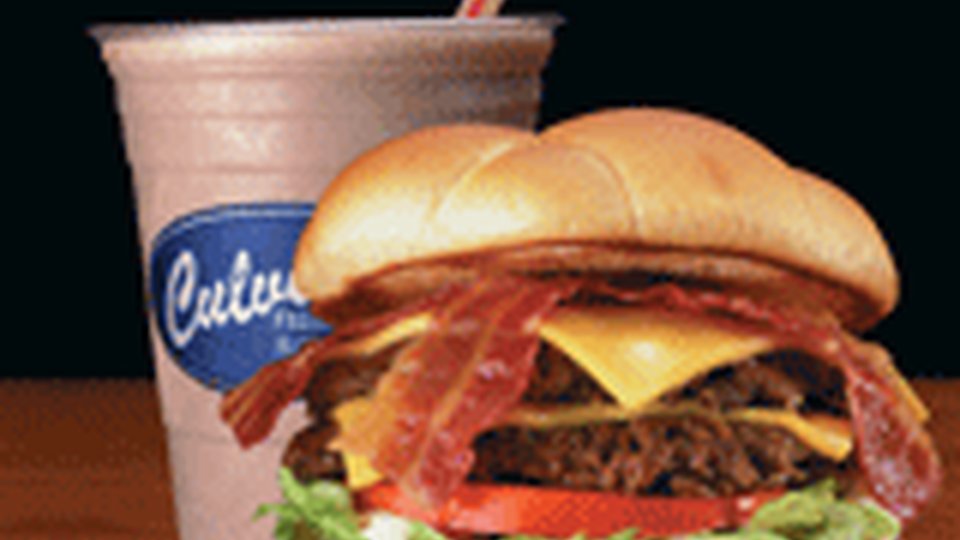Article
Culver's boot camp
Not just anybody can join the Culver's family.

June 4, 2006
Jerry Kozlowski mortgaged his house and cashed in his mother's retirement plan to tackle a new business venture in the late 1990s.
Kozlowski desired to join a dedicated group that required graduation of "Boot Camp," also known as Culver's franchise training.
"It's true. Every operator has to spend 16 weeks in a corporate store in Wisconsin doing every possible job," said Kozlowski, now a Culver's franchise operator.
 |
Culver's employees take orders and then a runner delivers the food to the table. |
From scrubbing floors to punching orders into a POS to picking up trash in the parking lot, potential operators work 15-hour days during Culver's Boot Camp. But it's time well spent, said Craig Culver, the chain's founder.
"(Boot Camp) is a cultivation piece where I get to know every single operator," Culver said.
The program also lets the Culver's founder evaluate an operator's strengths and weaknesses. If the candidate cannot handle the rigors associated with restaurant operations, he or she could be culled from the next "Franchise Class."
"We will only allow 12 in a Franchise Class, and we have three classes a year," Culver said. "We don't believe in growing fast. We believe in taking care of what you have and everything else will fall into place."
This conservative-business approach has worked for the Prairie du Sac Wisconsin-based hamburger chain. Since opening in 1984, the company has not closed a single store. And since 1999, Culver's has more than tripled its store count to 321.
-- Craig Culver Culver's founder |
Although growth has been steady, with the company goal of 40 new stores a year, each Culver's has its own set of challenges. Local-store marketing is a challenge outside of Wisconsin, where Culver's is king with 115 stores.
"We have eight restaurants in the Indy area and it's hard to get network television there," Culver said. "We have 46 restaurants in the metro Chicago area and we are just now getting to the point where we can get on network television."
With an advertising fee of 2 percent of net sales and average unit volumes of $1.6 million, Culver's encourages franchisees to use billboards, but "We can't put up a billboard where we only have a few stores," Culver said. "In Wisconsin, I like to have billboards everywhere because those work. We can't do billboards in Indy.
"We have to customize every store and that continues to be a challenge. But we're fortunate that our ad fee represents real money and our operators are able to cater their marketing programs."
Kozlowski said he's been successful by targeting schools and churches. Last year, his store donated 350 custard dishes to a local church for a senior member event. In the coming weeks, it will donate custard to an American Cancer Society walk and give students from a nearby school 25 percent off of custard, which is cost said store manager John Tex.
"We help a lot of fundraisers and it pays off," Tex said. "Those people we help come to our store and make a point to approach me and say 'I remember seeing you.'"
A lunch rush
Kozlowski's store is adjacent to a Dairy Queen. But on this summer day in Greenwood, Ind., few residents are looking for ice cream. The Culver's parking lot is full and the dining room is filled with patrons licking custard and two-handing ButterBurgers, Culvers two top menu items.
 |
The Culver's employee attire consists of nice pants, shirt and tie. |
Behind the counter, during this lunch rush, smiling teenagers are taking orders. These employees don't look like typical fast-food workers. They are dressed in neatly pressed khaki pants, white button-up shirts and ties. They even appear to be having a good time.
"If you ask Craig, he'll say the employees behind the counter are everything,"
Kozlowski said. "And to be honest, we don't do anything special to attract them. They (employees) just come to us based on a referral system."
Runners scurry through the dining room with trays of food, bringing the orders directly to customers.
"We like to think of ourselves as the original fast-casual restaurant because our customers have always placed orders at the counter and we bring them the food," Culver said. "I guess people don't like to consider a hamburger chain with a drive-thru fast casual. But I don't really care what people in the industry call us as long as people keep coming through our doors."
ButterBurgers and custard
The term ButterBurger is a registered trademark of Culver's. It is fresh made, never frozen, and the buns are lightly buttered and then toasted. It's the only hamburger from the QSR or fast-casual segment to win the National Cattlemen's Beef Association's Beef Backer Award.
In the early days, Culver said the company considered renaming the hamburger to BetterBurger. But as the chain built equity in its core menu item, customers soon learned what a ButterBurger was.
"It has become a brand in itself," Culver said.
The chain's other top menu draw is custard. When a store opens in an ice-cream-heavy area, Culver's educates consumers on the difference between ice cream and custard.
"I honestly believe frozen custard is better than ice cream because it's made fresh," Culver said. "It's not just an opinion. There are actual reasons custard tastes better, too."
Culver's vanilla custard contains 13 percent butterfat and the chocolate flavor contains 10 percent butterfat; both contain egg yolks for a richer flavor and velvety smooth texture. Culver's key marketing message behind its custard is it's made onsite daily.
"That's why we only serve three flavors a day," Kozlowski said. "Other stores make it ahead of time and freeze it (ahead of time) ... The more flavors you have the less fresh it will be."
Opening a store
Craig and his wife, Lea, are partners at Culver's. Between the two, there's nearly a half century's worth of restaurant knowledge.
 |
Lea (right) and Craig Culver, the founders of Culver's. |
"It's natural to work with my wife," Culver said. "I'll listen to what she has to say and hopefully she listens to what I have to say as well."
When Culver jumped into the owner-role 20 years ago, he had his wife and parents to lean on for business and operations advice. Unfortunately, not everybody in the restaurant business enjoys that luxury.
For those looking at opening a restaurant, Culver recommended the franchise route rather than starting from scratch.
"I don't know what the failure rate of the franchise side versus independents is, but you have a support system under the franchise system," Culver said. "Don't get me wrong, I'm all for people taking the risks – with independents. That's what makes America tick. It's just a lot harder to do it on your own these days."
Kozlowski agrees with Culver. After all, he had no restaurant experience when opening a Culver's franchise in an Indianapolis suburb three years ago. Used to the ButterBurger and Culver's custard, the native Wisconsinite was eager to begin his career in the foodservice industry and to bring the Culver's products to the Indianapolis area.
He admits there have been challenges, but it's been worth it. Kozlowski will open his second store this summer.
"There's a strong support system in the Culver's franchise community," he said. "We take care of one another."
Related Media
FranchisingPresented ByJeff's Bagel Run
Presented ByJeff's Bagel Run












